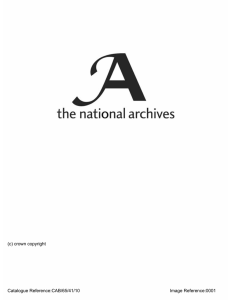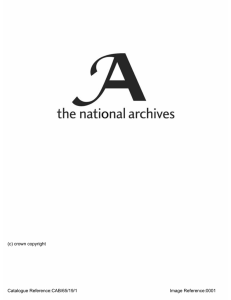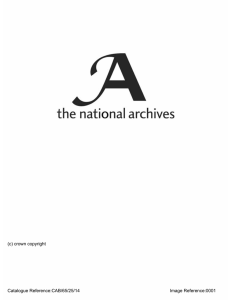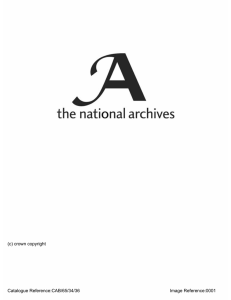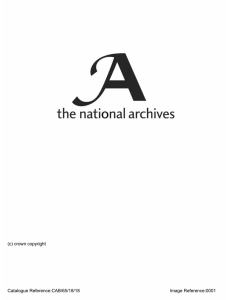(c) crown copyright Catalogue Reference:CAB/65/42/22 Image Reference:0001
advertisement
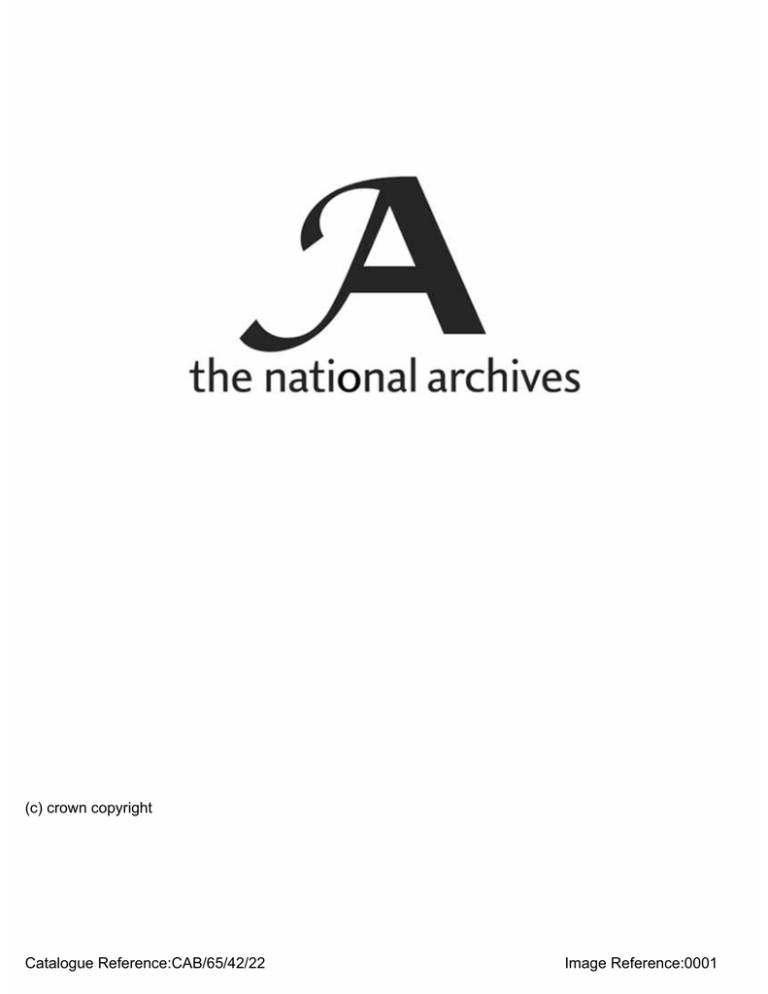
(c) crown copyright Catalogue Reference:CAB/65/42/22 Image Reference:0001 THIS DOCUMENT IS T H E PROPERTY Printed OP HIS BRITANNIC for the War Cabinet. M A J E S T V S May 1 9 4 4 . SECRET. C o p y No. W.M. (44) 64th Conclusions. WAR CONCLUSIONS C A B I N E T 64 (44). of a Meeting of the War Cabinet held at 1 0 Downing S.W. 1, on Tuesday, lQth May, 1 9 4 4 , at 5-30 p.m. Street, Present: The Right Hon. W I N S T O N S. CHURCHILL, M.P., Prime Minister (in the Chair). M.P., The Right Hon. ANTHONY EDEN, M.P., Lord President of the Council. Secretary of State for Foreign Affairs. The Right Hon. Sir JOHN ANDERSON, The Right Hon. E R N E S T BEVIN, M.P., M.P., Chancellor of the Exchequer. Minister of Labour and National Service. The Right Hon. OLIVER LYTTELTON, The Right Hon. HERBERT MORRISON, M.P., Minister of Production. M.P., Secretary of State for the Home Department and Minister of Home Security. The Right Hon. LORD WOOLTON, Minister of Reconstruction. The R i g h t Hon. C. R. ATTLEE, The following were also present: The Right Hon. J O H N CURTIN, M.P., The Right Hon. P . FRASER, M.P., Prime Minister of the CommonPrime Minister of New Zealand. wealth of Australia. Field-Marshal the Right Hon. J . C. Lieutenant-General His Highness the MAHARAJA OF J A M M U AND KASHMIR, SMUTS, Prime Minister of the Union Representative of the Government of of South Africa. India. The Hon. Sir FIROZ KHAN * NOON, Sir GODFREY HUGGINS, M.P., Prime Representative of the Government of Minister of Southern Rhodesia. India. The Right Hon. VISCOUNT CRANBORNE, The Right Hon. LORD BEAVERBROOK, Lord Privy Seal. Secretary of State for Dominion The R i g h t Hon. L . S; AMERY, The Right Hon. A. V . ALEXANDER, M.P., First Lord of the Admiralty. M.P., Secretary of State for India and Secretary of State for Burma. The Right Hon. Sir J A M E S GRIGG, M.P., Secretary of State for War. The Right Hon. Sir STAFFORD C R I P P S , K.C., M.P., Minister of Aircraft Production. The Right Hon. LORD CHERWELL, Paymaster-General. The Sir Right SINCLAIR, Hon. Bt., SIR M.P., ARCHIBALD Secretary Admiral of the Fleet Sir ANDREW First Sea Lord and . Chief of Naval Staff. Field-Marshal Sir ALAN BROOKE, Chief of the Imperial General Staff. CUNNINGHAM, ' EDWARD BRIDGES. Lieutenant-General Sir HASTINGS L. ISMAY. Mr. W. S. MURRIE. Mr. L. F. BURGIS. [27528-1] of State for Air. The Right Hon. BRENDAN BRACKEN, M.P., Minister of Information. Marshal of the Royal Air Force Sir CHARLES F.. A. PORTAL, Chief of the Air Staff. Secretariat. 72 GOVERNMENT *" it -52 W A R C A B I N E T 64 (44). CONTENTS. Minute No. 1 Subject. , Naval, Military and Air Operations .... .... Page 19 .... Air O p e r a t i o n s — H o m e Theatre. Mediterranean. S o u t h - E a s t Asia. Pacific. S t r e n g t h of t h e o u t p u t of G e r m a n aircraft. N a v a l Operations. Military O p e r a t i o n s — Italy. , R u s s i a , B u r m a and the Pacific. 2 3 United Kingdom Import Programme Prisoners of W a r .... .... .... .... .... .... .... .... .... 20 20 Naval, Military and Air Operations. (Previous Eef erenoe: W.M. ( 4 4 ) 60th Conclusions, Minute 1.) Air Operations. H o m e Theatre. Mediterranean. South-East Asia. Pacific. Strength of t h e output of German aircraft. 1. The Chiefs of Staff reported the events of the previous fourteen days. Bomber Command had flown 4,700 sorties and dropped 14,300 tons of bombs, almost all of them on targets in Occupied Territory. Mosquitoes had attacked targets in Germany, including Berlin. United States bombers had flown 6,500 sorties and dropped 12,000 tons of bombs, two-thirds on targets in Germany and the rest on railway centres and " Crossbow " targets. 2,000 tons of bombs had been dropped on Berlin in two raids. United States bombers had also attacked synthetic oil targets in Germany, inflicting severe damage on five plants. 2,600 tons of bombs had been dropped on " Crossbow " targets. The Allied Expeditionary A i r Force and the Tactical Air Force had made 33,000 sorties and had dropped 7,740 tons of bombs. Enemy losses claimed for the fourteen days were 504 aircraft destroyed, 62 probably destroyed and 189 damaged. Allied losses included 135 British and 126 United States bombers. By night 190 enemy aircraft had been over this country, of which 19 had been destroyed. In addition, 10 enemy aircraft had been destroyed by Intruder patrols. Night attacks by enemy aircraft had failed to achieve any concentration. In the Mediterranean 28,000 Allied sorties had been flown as against 2,000 by the enemy. 16,000 tons of bombs had been dropped, half on railway communications and harbours, and half on enemy airfields in Italy and battle targets. These figures included only the first two days of the land battle. Seventeen vessels had been sunk and 49 damaged. Enemy losses had been 189 aircraft destroyed compared with 147 Allied. On the 14th May the enemy had made a heavy attack on an Allied convoy off Algiers. The attack had been a complete failure and 20 per cent, of the enemy force had been destroyed. 9,800 sorties had been flown compared with 220 by the enemy. Thirty-four Japanese aircraft had been destroyed as against 21 Allied. Forty-seven small enemy vessels were claimed to have been sunk. Fifty-four enemy aircraft had been destroyed in this area compared with 21 Allied. The W a r C a b i n e t Invited the Chief of the Air Staff to render a return of the estimated output of German fighter and bomber aircraft at a current date and, say, six months ago. The return should also give an estimate of the total number of com­ pleted fighter and bomber aircraft in reserve, including those in transit, on each date. Shipping losses by enemy action in the past fortnight amounted to 10,000 tons. On the 7th May the Canadian frigate Valley field had been torpedoed and sunk by a U-boat off Cape Race. Fleet A i r Arm aircraft had attacked enemy shipping off the Norwegian coast. Two enemy ships had been sunk and a number of others damaged. Seven enemy aircraft had been destroyed and 6 of our aircraft lost. I n the Mediterranean 2 United States destroyers and a French destroyer had been torpedoed. Our ships had bombarded Rhodes and supply dumps and roads in Italy near the Anzio bridge­ head ; and our submarines had sunk a number of enemy caiques and shelled the South coast of France. The crews of 2 Greek warships had been removed for disaffection. I n the Indian Ocean an enemy U-boat had been driven ashore and the crew captured. Military The Chief of the Imperial General Staff gave an account of the Operations. attack which had started on the 11th May on the Italian front. The Italy. Poles, on the right, had made an advance behind Cassino, but had [27528-1] " 'B 2 Naval Operations. Russia, B u r m a and the Pacific. later been driven back. Elsewhere, along the whole front from Cassino to the sea, good progress had been made, particularly by the French troops in the centre. Generally, the situation was encouraging. There was no material change in the situation, The W a r C a b i n e t Took note of these statements. United Kingdom Import Programme. 2. Reference was made to a minute which the Chiefs of Staff had sent to the Prime Minister, suggesting that the demands of shipping for military operations might make it necessary that there should be a temporary cut in the monthly United Kingdom import programme. This would probably result in some reduction in our reserves. The Prime Minister directed that this minute should be circulated to the Ministers concerned, with a view to its early consideration. This led to the Prime Ministers of Australia and New Zealand saying that they would be glad to examine what measures they could take with a view to increasing the exports of foodstuffs from their countries to the United Kingdom. The War C a b i n e t Directed the Secretary to arrange that the Dominion Prime Ministers should be furnished with a selection of signifi­ cant figures of our production and import programmes. Prisoners of War. (Previous Reference: W.M.(44)llth Conclusions, M i n u t e 3.) 3. The Secretary of State for Air referred to a recent telegram from H i s Majesty's Minister at Berne. It appeared that on or about the 25th March 76 officers had escaped from the camp. Fourteen of these were still at large, 15 had been recaptured and 47, according to the account given to the Swiss Camp Inspector by the Camp Commandant, had been killed, some while offering resistance on recapture, others on a new attempt to escape after capture. I t seemed improbable that so large a number of officers should have resisted arrest. Further, some of the recaptured prisoners had stated that about 30 of their fellows had been seen leaving Gorlitz prison on a lorry, handcuffed, under police escort. The officers killed included not only British officers, but also officers of Dominion and Allied forces. The War Cabinet would no doubt desire to consider what action should be taken and what announcement should be made. The next-of-kin had been informed and some statement would have to be made at a very early date. The Secretary of State for Foreign Affairs proposed that a telegram should immediately be sent to H i s Majesty's Minister at Berne, instructing him to ask the Swiss Government to take up the matter at once with the German Authorities, at the highest level, and to demand a full and immediate report on the circumstances in which the officers had lost their lives. He suggested that, if possible, no statement should be made until a reply had been received. Full information would be given to the Dominion Governments. The Secretary of State for War agreed that it would be preferable to await a reply before making any public statement, but doubted whether a statement could be deferred for more than forty-eight hours. Mr. Curtin referred to reports about the treatment of prisoners in the hands of Japanese, and said that everything pointed to the fact that they were being badly treated. The representations so far: made to the Japanese Government appeared to have had no result. He did not believe that a policy of reprisals would have any effect on the Japanese. He asked whether the Soviet Government might be willing to intervene with the Japanese Government. The Secretary of State for Foreign Affairs explained that the Soviet Government had already approached the Japanese Govern­ ment on this subject, though it was not yet known with what result. The W a r C a b i n e t Approved the draft telegram which the Secretary of State for Foreign Affairs proposed to send to His Majesty's Minister at Berne, and agreed that, if possible, any Government statement should be deferred until a reply had been received. Offices of the War Cabinet, S. W. 1, IQth May, 1944.
